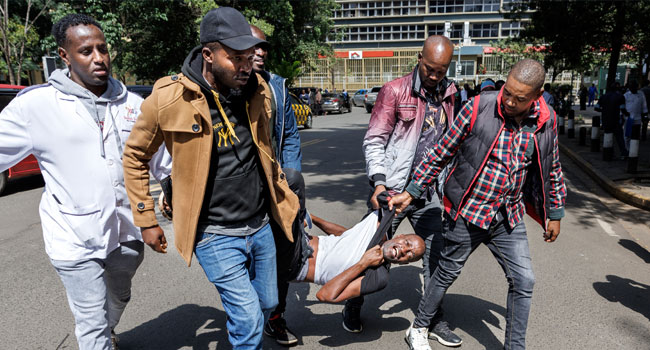Kenyan police used tear gas and detained about twelve demonstrators on Tuesday as hundreds gathered near parliament to protest against proposed tax increases, as reported by AFP journalists present.
The country, known for its robust economic status in East Africa, is currently grappling with a significant rise in the cost of living, exacerbated by new taxes outlined in a bill slated for parliamentary debate later in the day.
The government, facing financial strain, defends the move, estimating it will generate approximately 346.7 billion shillings ($2.7 billion), equivalent to 1.9 percent of GDP, aiming to reduce dependency on foreign borrowing.
In Nairobi’s bustling business district, clad in black, demonstrators marched towards parliament but were met with police dispersing tear gas into the crowds.
“I’m exhausted. The prices of everything have skyrocketed; life has become unaffordable,” lamented 29-year-old Rara Eisa.
Eisa, a first-time protester, described the hikes as oppressive, emphasizing, “They are showing no mercy.”
Protesters brandished signs proclaiming “do not impose these taxes on us,” referring to President William Ruto as Zakayo, Swahili for the biblical tax collector Zacchaeus.

Among the bill’s contentious clauses are a 2.5 percent tax on motor vehicles based on their value and the reintroduction of VAT on bread.
Dubbed “Occupy Parliament,” news of the protest spread online after an activist leaked MPs’ contact details, urging people to inundate them with calls and messages to defeat the bill proposing the hikes.
Although analysts warn the taxes could dampen consumption and harm the economy, the bill is expected to pass given the sizable parliamentary majority Ruto’s party holds.
In response to internal dissatisfaction, Ruto convened a meeting to rally his MPs in support of the bill ahead of the parliamentary debate, scheduled for approval by June 30.
The Kenya Human Rights Commission (KHRC) called on police to “halt the arrests,” asserting, “Our constitution guarantees our right to protest. We will not be deterred.”
Elected in 2022 on promises to rejuvenate the economy and uplift the underprivileged, Ruto’s policies, including increased income tax and health insurance contributions, and a doubling of VAT on petroleum products to 16 percent, have sparked widespread discontent.
Last year’s tax hikes prompted opposition protests, occasionally escalating into fatal clashes between police and demonstrators.
Despite Kenya’s status as one of East Africa’s most dynamic economies, about a third of its 51.5 million inhabitants live below the poverty line.
Annual inflation remains high, with overall inflation at 5.1 percent in May, food inflation at 6.2 percent, and fuel inflation at 7.8 percent, according to central bank data.
The World Bank noted this month that Kenya’s real GDP growth accelerated to 5.6 percent last year from 4.9


